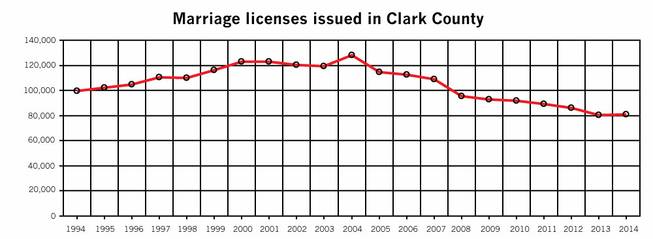They’re Leaving Las Vegas: Fewer I Do’s in Last Decade

When it comes to destination weddings, Las Vegas has lost that loving feeling. The Las Vegas Sun reports that the wedding rate in Sin City has plummeted 37 percent in the past decade—nearly 47,000 fewer couples got married in 2014 than in 2004.
By comparison, 2004 was a boom year for weddings in Sin City. There were 128,000 weddings that year—including Britney Spears’ 55-hour marriage to Jason Allen Alexander at A Little White Wedding Chapel.

Related: Marriage?? Young Americans Aren’t Even Shacking Up
Who knows why gambling on love in Sin City has become a losing bet? Perhaps the dip reflects a national trend of millennials waiting to tie the knot or choosing to stay single. The marriage rate in the U.S. neared a record low in 2015 and is expected to drop further in 2016. Then there’s the expense. According to the TheKnot, the average wedding cost (excluding the honeymoon) is $31,213, with many couples looking for more unusual venues.
Clark County Clerk Lynn Goya, who took office in January, wants to change that trend in Vegas. The current fee for a marriage license in Las Vegas is $60, but Goya is asking for a $14 increase in the cost of wedding licenses to support marketing efforts targeting engaged couples. Last year 81,000 weddings happened in Las Vegas—and she’s hoping that wedding vow renewals and gay weddings will help boost those numbers even more. In New York, the legalization of gay marriage in 2011 led to an estimated $259 million in spending and $16 million in revenues for New York City.
Related: The $2.6 Billion Gay Wedding Boom
Then again it may be hard for Las Vegas to shake that quickie, drive-thru wedding image. Sin City has always had an illustrious history of celebrity weddings, with many more misses than hits: Cher’s nine-day union to rocker Gregg Allman in 1975, Mia Farrow and Frank Sinatra in 1966, Demi Moore and Bruce Willis in 1987, Richard Gere and Cindy Crawford in 1991, and Angelina Jolie and Billy Bob Thornton in 2000. On the bright side, there’s Paul Newman and Joanne Woodward’s marriage, which endured for 50 years, Jon Bon Jovi and his wife, Dorothea’s 1987 wedding day, and Kelly Ripa and Mark Consuelo’s union from 1996, which is still standing.
Big Ad Buys to Push Tax Reform
Two conservative groups are spending millions to promote an overhaul of the tax code.
The American Action Network announced Thursday that it will spend $2 million on a new TV ad featuring a Midwestern mom who says her family is “living paycheck to paycheck” and that a middle class tax cut would give them “piece of mind.” The ad will air in 28 congressional districts currently held by Republicans. Americans for Prosperity, backed by the Koch brothers, will spend $4.5 million on ads that promote tax reform while criticizing three red-state Democratic senators -- Claire McCaskill (MO), Tammy Baldwin (WI) and Joe Donnelly (IN).
Some States Will See Dramatic Obamacare Price Hikes in 2018

Premiums for Affordable Care Act policies are set to rocket higher in many places in 2018. Many of the rates for next year won't be made public until November, but The New York Times found that Georgia has already approved increases of up to 57.5 percent, while the average rate in Florida will jump by about 45 percent and the average in New Mexico will climb by 30 percent. Minnesota, on the other hand, announced this week that a new state reinsurance program has helped stabilize rates and price changes for individual plans in the state will range from a decrease of 38 percent to an increase of 3 percent.
Confusion stemming from the White House and Congress, including uncertainty about whether the Trump administration will continue to make cost-sharing payments to insurers, is largely driving the increases. Keep in mind, though, that about 85 percent of people who buy insurance through Obamacare exchanges won’t feel the price hikes because their plans are subsidized — but the federal government will have to shell out more for those subsidies.
A Tax Reform 'Game Changer'?
The National Association of Home Builders says it's open to changes to the mortgage-interest deduction — a major policy shift that could have significant implications for the Trump administration's proposed tax reform, Politico's Lorraine Woellert reports. The break benefiting homebuyers was preserved as part of the tax framework released last week, but the reform plan also calls for increasing the standard deduction, a shift that would make the mortgage interest deduction less valuable. The National Association of Realtors last week criticized the administration's plan, even though it left the mortgage tax break in place. "This proposal recommends a backdoor elimination of the mortgage interest deduction for all but the top 5 percent who would still itemize their deductions," the group's president said.
Warren Buffett: Eliminating the Estate Tax Would Be a ‘Terrible Mistake’

The world’s second-wealthiest man is worth about $75 billion, but he isn’t worried about the government taking a bite out of his estate after he’s gone. In fact, Buffett thinks the estate tax, which applies to just a few thousand estates a year, is a reasonable way to allocate resources, especially in a society in which the rich have gotten much richer over the last few decades. Buffett’s main concern is the emergence of “dynastic wealth” that “goes totally against what built this country, what this country stands for.” In an interview Tuesday, Buffett criticized the latest GOP proposal to get rid of the estate tax: "If they pass the bill they're talking about, I could leave $75 billion to a bunch of children and grandchildren and great-grandchildren. And if I left it to 35 of them, they'd each have a couple billion dollars ... Is that a great way to allocate resources in the United States?” (CNBC)
Treasury Pulls a Paper That Contradicts Mnuchin’s Corporate Tax Argument
The Treasury Department has taken down from its website a 2012 analysis that found that business owners and shareholders — not workers — bear most of the burden of corporate taxes. The findings of the report run counter to the argument Treasury Secretary Steven Mnuchin has been making in selling the benefits of a reduction in the corporate tax rate. The Trump administration’s tax reform framework calls for dropping the corporate rate from 35 percent to 20 percent.
The 2012 report from the Office of Tax Analysis found that “workers pay 18 percent of the corporate tax while owners of capital pay 82 percent” — figures that are “in line with many economists’ views and close to estimates from the nonpartisan Joint Committee on Taxation and Congressional Budget Office,” according to The Wall Street Journal.
A Treasury spokeswoman told the Journal: “The paper was a dated staff analysis from the previous administration. It does not represent our current thinking and analysis.”
Jason Furman, who was chairman of President Obama’s Council of Economic Advisors, tweeted that the goal of the technical paper series that included the removed study “was to be more transparent about the methodology Treasury used for its modeling and analysis.”
Treasury website has 40+ yrs of Tax Working & Technical Papers. This is the only one removed https://t.co/QzLTSHderk https://t.co/MFZRd7HoFQ
— Jason Furman (@jasonfurman) September 29, 2017
